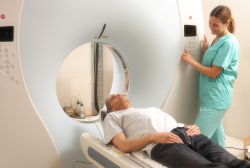
Brain cancer is a disease in which abnormal cells grow within the brain and form masses, known as tumors. As the cancer grows, the central nervous system can suffer, causing a wide variety of debilitating symptoms. While this condition is serious, there are many different brain cancer treatment options available that can help. If you or a loved one is concerned about this condition, the following overview can help you become more familiar with recognizing, diagnosing, and treating the disease.
A Basic Guide to Brain Cancer
How Common Is Brain Cancer?
According to the American Cancer Society (ACS), the chance of developing a malignant brain or spinal cord tumor is less than 1%. The organization estimates that approximately 23,880 malignant cases will be diagnosed in 2018.
What Are the Different Types?
While there are many different types of brain tumors, they are generally classified as primary or metastatic. Primary brain cancer is when abnormal cells develop in any tissue or cell in the brain or spinal cord. Metastatic cases are when the cancer spreads to the brain from another affected part of the body.
Who Is at Risk?
Unlike other types of cancer, brain tumor risk is not connected to lifestyle factors such as smoking or diet. However, the ACS does recognize that radiation exposure and family medical history may increase a person’s risk of developing the disease.
What Are the Symptoms?
According to the ACS, common symptoms include headaches, seizures, behavioral changes, fatigue, weakness, balance problems, memory loss, nausea, and vomiting. Some may also have trouble walking, talking, hearing, or seeing. If you are experiencing these symptoms, consult an oncologist for a diagnosis.
How Is the Condition Diagnosed?
 Oncologists rely on medical imaging tests — including MRI, CT, and PET scans — to detect tumor growth. However, since these tests can only reveal the presence of a tumor, a biopsy may also be required to determine the type of cancer. During a biopsy, a small sample of tissue is removed from the affected area and studied. The cancer is then graded based on the severity of cellular activity.
Oncologists rely on medical imaging tests — including MRI, CT, and PET scans — to detect tumor growth. However, since these tests can only reveal the presence of a tumor, a biopsy may also be required to determine the type of cancer. During a biopsy, a small sample of tissue is removed from the affected area and studied. The cancer is then graded based on the severity of cellular activity.
What Brain Cancer Treatment Options Are Available?
There are many different brain cancer treatment options available. If the tumor is benign — or non-cancerous — an oncologist may recommend monitoring growth until further action is required. In more severe cases, the National Institutes of Health say surgical removal, radiation therapy, and chemotherapy are common approaches to brain cancer treatment.
With help from a trusted oncology team, brain cancer can often be managed and treated successfully. That’s why families in the Crossville, TN, area turn to Tennessee Plateau Oncology – Dirk Davidson M.D. Since 2002, this clinic has been recognized for providing state-of-the-art diagnosis and treatment services, including brain cancer treatment. To schedule a consultation with a compassionate oncologist, call (931) 484-7596.
About the Business
Have a question? Ask the experts!
Send your question

